Inside Iraqi air base as Islamic State closes in
- Published
Quentin Sommerville had exclusive access to Ain al-Asad airbase for this 2014 report
Ain al-Asad air base, the largest in Iraq's western province of Anbar, has been encircled by militants from Islamic State (IS). The BBC's Quentin Sommerville, the first Western journalist to make it to the facility since IS launched a nationwide offensive in June, found soldiers on the defensive as the militants close in.
At Ain al-Asad, soldiers and their armoured vehicles had departed. The camp was quiet, almost peaceful. But we were in fact in the eye of a storm.
On multiple fronts, troops were out fighting - and losing - battles with Islamic State (IS) militants.
We had come to see an offensive. Instead, we found a retreat.
The army's planned assault on the IS stronghold of Hit was forgotten. IS had launched a surprise attack.
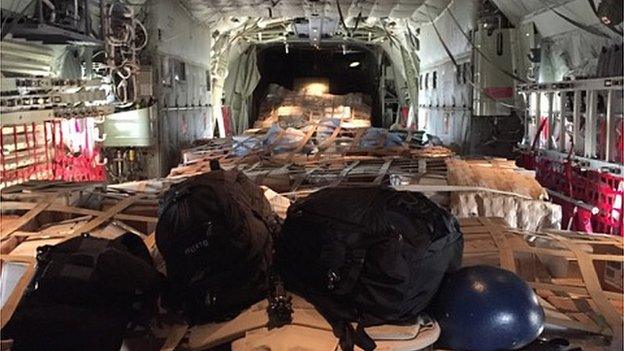
The only safe way into Ain al-Asad is by air force plane - like this C130 bringing food and supplies
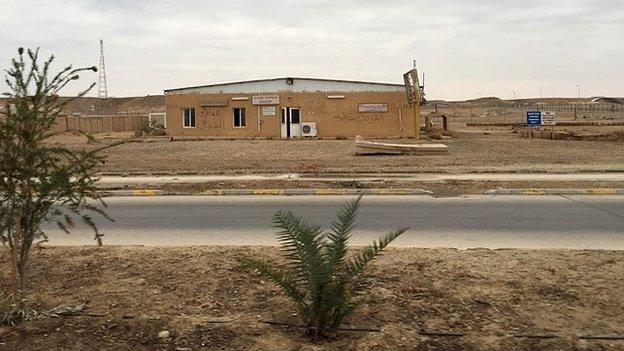
The Forever Cafe, now long closed. US Marines, though, are back at the base to provide training
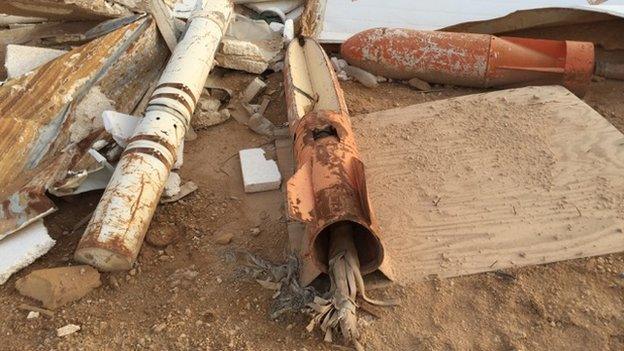
US troops left behind a mess, with empty shells littering the ground
"From 07:00 until 11:00, we lost territory that had taken us two weeks to gain. In a few hours, it was gone," said a senior officer from the Iraqi Army's 7th Division, who did not want to be named.
As many as 15 villages surrounding the base fell to the militants: Mahboubiya, Juba, Jabha, Dulab... the list went on, the militants moving ever closer.
Qais, a pro-government fighter from the Al Bu Nimr tribe, made it to the relative safety of the camp. "I'd had early prayers in Juba, but by the afternoon, it had fallen. IS took trailers full of weapons," he said.
He was trying to get to Baghdad to meet his commanders. His family were still in Juba, which was now held by IS.
Air strikes plea
Ain al-Asad stretches for miles. It was the biggest US army base during the Iraq War.
Reminders of American occupation are everywhere - spent artillery shells and dusty accommodation quarters, with uneaten ration packs strewn across the floor.
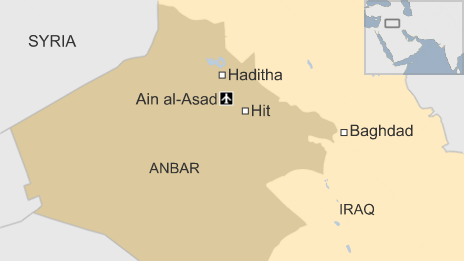
By the camp's barber shop stands a duty-free store and the long-closed "Forever Cafe".
Even though the base is much diminished, it remains a linchpin in the country's biggest province.
If Anbar falls, Islamic State will stretch from Syria all the way to the edge of Baghdad.
From near the edges of the camp, outgoing mortars could be heard, launching and landing. The soft booms of distant artillery occasionally made those on the base stop and look to the horizon for a moment.
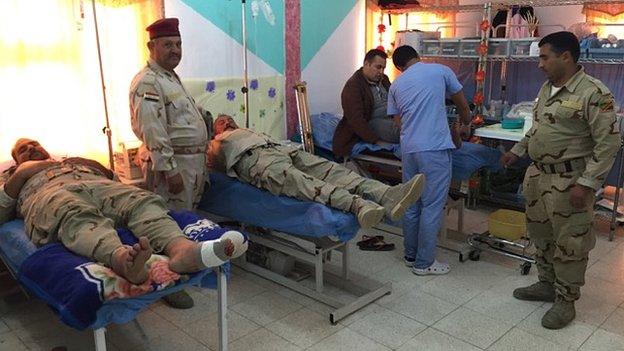
In the past week the base has suffered many casualties
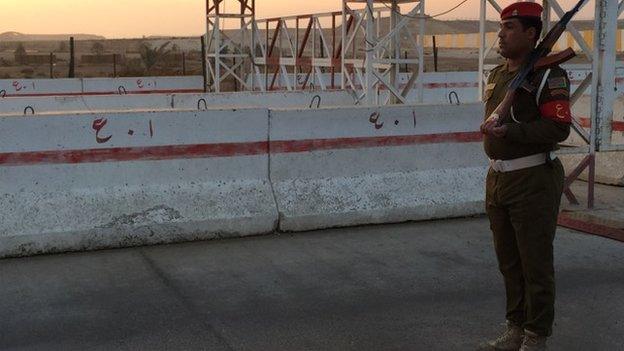
It is under increasing threat as Islamic State fighters advance in surrounding villages
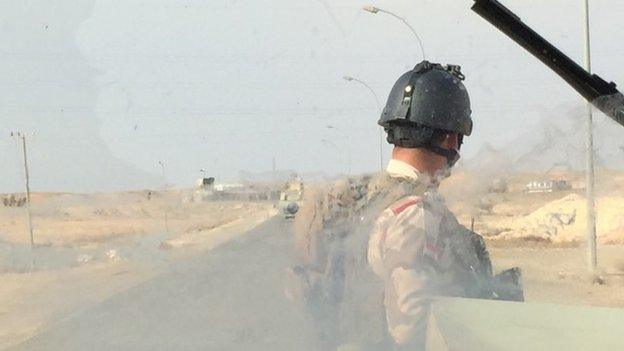
Outside the base, soldiers are on their guard. Roadside bombs and snipers are the biggest danger
At night, two days into the IS offensive, soldiers from the 7th Division returned to the base, exhausted, and angry. They blamed the lack of aerial cover for the losses.
"We stood our ground. But IS advanced with tanks - we only have Humvees," Pt Karar Hadi said.
"What we need are helicopters and combat aircraft. I don't know why the planes didn't come. They're saying the conditions are wrong, but the weather is fine now. In two days, there wasn't a single air strike."
Eventually, there were air raids, but by then much territory had already been lost. It could take weeks, if not months to regain, if it is ever retaken.
Back in January, IS seized Falluja, one of Anbar's biggest cities. Since then, the militants have tightened their grip. With their supporters, they now control almost 80% of the province.
With the world's attention on Syria, it has been a largely unseen humanitarian crisis, with more than 500,000 people displaced.
Booby-traps
We are the first Western journalists to visit Ain al-Asad since IS established its self-declared caliphate in June.
In a convoy of armoured Humvees, we drove with the troops to their field command. In some of the villages we passed through, shops were open and children waved to the soldiers. But outside it was a different story.
In the driving seat was Sgt Abu Mahdi. "When you're in a convoy, the biggest risks are the roadside bombs, from IS or their supporters - and they booby-trap houses, as well as having snipers. These are the most deadly of their tactics, but, God willing, we can deal with them."

Anbar is mostly Sunni, and in many of its villages IS has been welcomed. Iraq's army is the enemy, and the soldiers remain on their guard.
In only three days, the frontline had crept forward, closer to Ain al-Asad. When we arrived, it was 30km (18 miles) away. When we left, it was less than 10km.
Sunni tribes who have taken up arms against the militants have suffered. They formed the backbone of the Awakening Councils, which helped the US defeat al-Qaeda militants during the Iraq War.
Sheikh Naim al-Gaood of the Al Bu Nimr tribe, explained: "From my tribe there are 762 martyrs, [including] 31 women and 26 children.
"Some of them were slaughtered with swords; some of them were executed by bullets to the head. Children as young as six months old were killed while sitting on their mothers' laps. Some of the children were thrown in the river, and others down wells."
It is thought that dozens of Iraqi soldiers have been killed or kidnapped in the current offensive.
Strong resolve
On the chain-link fences around Ain al-Asad, ragged black death notices flap in the soft breeze. Among those killed was a Brig Abbas Radad, the head of the division's special forces.
"It wasn't a tragedy - he is a martyr who sacrificed his life to defend his country," Col Abu Mahmoud told me.
"All of us here would do the same. We will not allow these people to take Iraq. He was killed by a sniper - a coward who shot from afar - they don't show their faces," he added.
The Americans are back in Ain al-Asad, and three of their army medics tried to save Brig Radad.
Their primary role is training tribal fighters. They are in a private corner of the camp - largely unseen. But their presence is viewed as essential.
Qais, the Al Bu Nimr fighter, said: "We know that Ain al-Asad will never fall while the Americans are here. They won't let it happen."